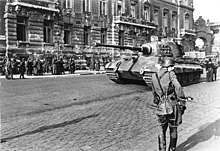Company Panzerfaust
Company Panzerfaust was the code name for a German commando operation carried out on October 15, 1944 during the Second World War to prevent a feared dissolution of the alliance between Hungary and the German Reich or to anticipate a possible change of course by the nationalist Reich administrator Admiral Miklós Horthy . In the broadest sense, it was a coup by SS units in Budapest .
background
After the then Hungarian government had started negotiations with the Western powers on a separate peace in the summer of 1943 , the German-Hungarian relationship deteriorated noticeably. Hungary's refusal to provide troops necessary for the occupation of the Balkans, as well as demands to be allowed to withdraw the occupation troops from Ukraine and Belarus , were viewed with suspicion by the Germans. In March 1944, the German Wehrmacht occupied large parts of Hungary in the Margarethe company in order to chain it to Germany's side. It was also intended to prevent Hungary from falling away from the Axis Alliance, so that all reserves of strength for total warfare could be exhausted.
At the end of August 1944, the previous German ally Romania concluded an armistice with the Soviet Union after a coup and declared war on the German Reich. Subsequently, the Red Army pushed the Hungarian-German units back into the Hungarian lowlands in September and October .
execution

Hitler had been informed that Reichsverweser Admiral Horthy was considering a surrender to the Soviet troops or Stalin . The real initiator of this project, however, was the admiral's son, Miklós Horthy Jr. To prevent his influence, it should be turned off.
SS-Sturmbannführer Otto Skorzeny was commissioned to carry out such an operation . Skorzeny received all the necessary powers to do this. The procedure was given the code name company Panzerfaust . In the run-up to the operation, the Higher SS and Police Leader for Hungary, Otto Winkelmann , had secretly arrested Horthy's military confidants, such as the commander of the Hungarian 1st Corps, Lieutenant Field Marshal Bakay.
On the morning of October 15, 1944, Skorzeny and members of the SS Parachute Battalion 600 stormed the most important government offices in Budapest and kidnapped Miklós Horthy Jr., the Reich Administrator's only living son. This was immediately taken out of the country. At 12 noon, Horthy received the German ambassador Edmund Veesenmayer , threatening him with his country's withdrawal from the war. A short time later a prepared statement was broadcast on the radio, whereupon the station was occupied by the SS. In another meeting, the German special envoy Rudolf Rahn Horthy tried to change his mind.
After this meeting, the Germans decided to remove Horthy and replace him with the Arrow Cross leader , Ferenc Szálasi , and to give the Hungarians an ultimatum until the next morning. In the early evening, Chief of Staff János Vörös issued an order to all units of the Hungarian army , according to which the fight against the Red Army could not be stopped for the time being. A delegation from the Hungarian government went to the German embassy to negotiate a peaceful solution. At the same time, the Germans occupied the Danube bridges and access roads to the castle palace with the aim of storming it when the deadline passed. An alternative plan by SS-Obergruppenführer Erich von dem Bach-Zelewski , who intended to shoot down the seat of government (the actual royal palace) with artillery, was not implemented. After the storm began, Horthy went into German captivity and announced his resignation.
To keep Hungary at war, the previous government was completely dismantled and General Géza Lakatos was deposed. In his place, Horthy entrusted Szálasi with the formation of a government in his forced abdication document. The next day he took over the office of Prime Minister and State Leader in Budapest. Also on October 16, Skorzeny was promoted to SS-Obersturmbannführer for the successful execution of the company.
Hungary thus remained an ally of the German Empire. Although the Red Army occupied the entire country by the beginning of April 1945, some Hungarian units continued to fight on the German side until the end of the war.
See also
Web links
Individual evidence
- ↑ Operation Panzerfaust - The coup of the SS in Budapest on October 15, 1944 epa.oszk.hu - Retrieved on April 4, 2013
- ↑ The order under the skull / climax and decline of SS power spiegel.de - accessed on April 4, 2013
